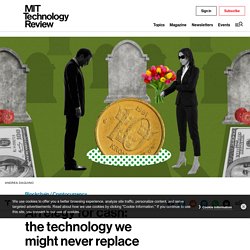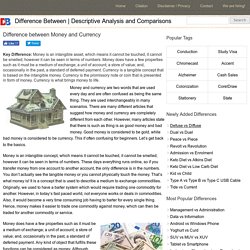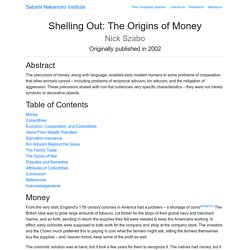

Money does have a few properties such as it must be a medium of exchange; a unit of account; a store of value; and, occasionally in the past, a standard of deferred payment.
Currency is a tangible concept that is based on the intangible money. Currency is the promissory note or coin that is presented in form of money. Currency is what brings money to life.
We are living in an age when the money we use in our daily lives is transforming from a bearer asset into a surveillance + control mechanism.
An elegy for cash: the technology we might never replace. Think about the last time you used cash.

How much did you spend? What did you buy, and from whom? Was it a one-time thing, or was it something you buy regularly? Was it legal? If you’d rather keep all that to yourself, you’re in luck. Money is not meant to be held. Assets are, fiat money is not an asset. Money vs Currency. Key Difference: Money is an intangible asset, which means it cannot be touched, it cannot be smelled; however it can be seen in terms of numbers.

Money does have a few properties such as it must be a medium of exchange; a unit of account; a store of value; and, occasionally in the past, a standard of deferred payment. Currency is a tangible concept that is based on the intangible money. Currency is the promissory note or coin that is presented in form of money. Currency is what brings money to life. Money and currency are two words that are used every day and are often confused as being the same thing.
Digital Cash. Financial Health. Consumerism. Problem Gambling. How to retire in your 30s: save most of your money and rethink your core values - Vox - Pocket. Photo by: Shutterstock Seven in 10 Americans are disengaged from their jobs, according to Gallup.

That's more than two-thirds of us who are unfulfilled by our work, just dragging our sorry selves to and from the office every day. One community has an attractive answer: just quit. A burgeoning online community advocates early retirement. And they're not talking about people quitting in their 50s or early 60s. Over the past few months, I've interviewed seven people who have managed to leave the working world before age 40. Cut down on the big three, then invest The basic framework of early retirement is pretty simple: cut way down on your spending, then invest your savings. And the best place to start on cutting costs isn't with coupons or thrift stores; it's with the big purchases. "While many of my coworkers were maybe leasing a new BMW SUV, I sold my car and started riding my bike.
How do you know when you're ready to retire? Mr. A lifestyle and a subculture "Earlier this year Mrs.
Podcasts. Value as a Mean. Extrinsic Rewards. Shelling Out: The Origins of Money. Abstract The precursors of money, along with language, enabled early modern humans to solve problems of cooperation that other animals cannot – including problems of reciprocal altruism, kin altruism, and the mitigation of aggression.

These precursors shared with non-fiat currencies very specific characteristics – they were not merely symbolic or decorative objects. Table of Contents Money From the very start, England's 17th century colonies in America had a problem – a shortage of coins[D94][T01] The British idea was to grow large amounts of tobacco, cut timber for the ships of their global navy and merchant marine, and so forth, sending in return the supplies they felt were needed to keep the Americans working. The colonists' solution was at hand, but it took a few years for them to recognize it. Necklace of wampum. Clams were found only at the ocean, but wampum traded far inland. Collectibles Native American money took many forms besides shells. Evolution, Cooperation, and Collectibles. [thread] “Shelling Out: The Origins of Money” by @NickSzabo4.